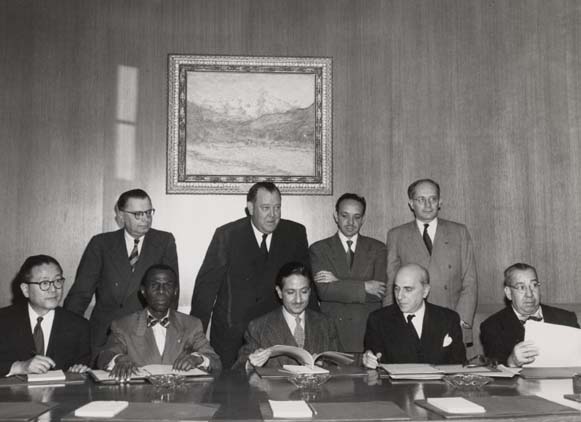Genocide
Genocide. A crime against humanity consisting of the deliberate, systematic destruction of entire racial, national, ethnic, or religious groups. Genocide has been practiced throughout history. In the 20th century, the Turkish genocide of the Armenians in 1915–17 was the first instance. The best-known genocides were perpetrated by the Nazi regime during the Second World War, especially against the Jews and Gypsies, in Germany and the occupied countries. The term was in fact coined by Rafael Lemkin in 1944 to describe the Nazi destruction of nations during the war.
Ukrainians have been subjected to genocide under the Soviet regime, especially during the Stalinist terror, the Second World War, and most notably in the Famine-Genocide of 1932–3, which afflicted Ukraine, northern Caucasia, and the Volga German ASSR. The genocidal intent of the Soviet authorities is confirmed by the geographic extent of the famine, which affected only certain national groups and especially the Ukrainians; the official Soviet policy of forced grain procurement throughout this period and the speed with which the famine abated after that policy was abandoned; the official rejection of all Western offers of assistance; and especially the continued Soviet export of grain throughout the period. Despite the existence of sufficient food reserves and satisfactory harvests, food was not released to the people and consequently 7 to 10 million people perished, either from starvation or from diseases caused by severe malnutrition. In the case of Ukraine the famine was calculated to destroy the indigenous culture by decimating the nation.
Soviet historians and leaders denied the existence of any famine in 1932–3, although they have infrequently referred to ‘difficulties in the food situation’ in the early 1930s, which was attributed to natural causes and the dislocations resulting from collectivization and industrialization; these explanations were generally accepted by many contemporary Western observers and later historians. This is due, at least partly, to the fact that Joseph Stalin, unlike Adolf Hitler, never articulated a genocidal policy vis-à-vis the Ukrainians.
Genocide was recognized as a crime under international law in 1946 under the impact of the revelations at the Nuremberg trials. In 1948, the General Assembly of the United Nations approved the Convention on the Prevention and Punishment of the Crime of Genocide. It went into effect in 1951, but no court of international jurisdiction was created, and international sanctions against violators of the convention have been largely ineffective. The Ukrainian SSR signed and ratified the convention in 1954.
BIBLIOGRAPHY
Deker, Nikolai; Lebed, Andrei (eds). Genocide in the USSR:Studies in Group Destruction. Institute for the Study of the USSR (Munich), series 1, no. 40 (July 1958)
Kamenetsky, Ihor. Secret Nazi Plans for Eastern Europe: A Study of Lebensraum Policies (New York 1961)
Conquest, Robert. The Nation Killers: The Soviet Deportation of Nationalities (London 1970)
Horowitz, Irving. Taking Lives: Genocide and State Power (New Brunswick, NJ and London 1980)
Kuper, Leo. Genocide: Its Political Use in the Twentieth Century (Harmondsworth 1981)
Porter, Jack. (ed). Genocide and Human Rights: A Global Anthology (Washington 1982)
Charny, Israel. (ed). Toward the Understanding and Prevention of Genocide: Proceedings of the International Conference on the Holocaust and Genocide (Boulder, Colo 1984)
Kuper, Leo. The Prevention of Genocide (New Haven and London 1985)
Conquest, Robert. The Harvest of Sorrow: Soviet Collectivization and the Terror-Famine (Edmonton and New York 1986)
Serbyn, R.; Krawchenko, B. (eds). Famine in Ukraine 1932–1933 (Edmonton 1986)
[This article originally appeared in the Encyclopedia of Ukraine, vol. 2 (1989).]
